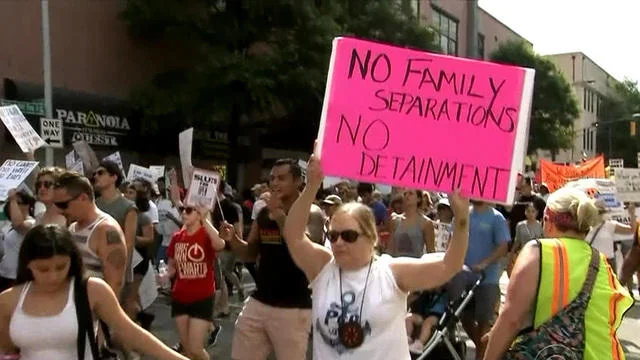In a shocking turn of events, an Iranian woman and mother, Arpineh Masihi, was detained by federal agents in Diamond Bar, California, under the very immigration policies that her husband, Arthu Sahakyan, publicly supports. This incident raises critical questions about the human cost of strict immigration enforcement and the hypocrisy that often accompanies political allegiance.
Immigration Policies Fuel Family Separation
Arpineh Masihi"s detainment is emblematic of the broader crisis surrounding U.S. immigration policies, which have disproportionately affected marginalized communities. According to research, immigration detention is linked to higher rates of depression and PTSD, particularly for those who have experienced trauma prior to their arrival in the U.S. As reported by the National Institutes of Health, the mental health ramifications of such policies cannot be overstated.
Supporters Must Confront the Consequences
Sahakyan’s unwavering support for President Trump reveals a troubling contradiction. He expresses understanding of the need for vetting Iranian nationals amid heightened tensions following U.S. military actions in Iran. Yet, his wife, who has faced a long battle to regain her citizenship due to a past conviction, is now locked away, leaving their four children without their mother. Sahakyan admits that witnessing his wife"s detainment has shifted his perspective, acknowledging, "I was very selfish before." This admission prompts a crucial reflection on how policies intended for national security can devastate families.

Divorce separation and family breakdown with man Vecto…
The Human Cost of Immigration Enforcement
Masihi’s story is not an isolated case. NPR reports that the Trump administration has again opened detention centers for immigrant families, which advocates claim result in severe mental health issues for children and parents alike. The emotional toll on families like the Sahakyans cannot be measured, as countless children face the trauma of separation from their parents—an outcome that runs contrary to the family values many claim to uphold.
Voices of the Marginalized Demand Action
Masihi’s emotional phone call highlighted the urgency of family reunification efforts. "I’m on the list to be going to a different facility," she said, her voice trembling with uncertainty. Such sentiments resonate deeply within immigrant communities, where fear and anxiety have become commonplace under the current administration. The psychological impacts of these policies are profound, leading to increased rates of trauma among those affected, as noted in AP News.

Americans march in rallies across the country to protest immigration policies
Political Allegiances and Moral Responsibility
Sahakyan’s insistence on displaying Trump flags outside his home, even amid this personal crisis, reflects a broader societal issue: the disconnect between political allegiance and moral responsibility. This scenario does not only affect the Sahakyan family; it serves as a microcosm of the systemic failures inherent in U.S. immigration policy that prioritize enforcement over empathy. It forces us to confront the uncomfortable reality that political ideologies can lead to complicity in suffering.
As the Sahakyan family grapples with the fallout from their situation, they are emblematic of a larger struggle against an immigration system that often prioritizes punitive measures over human dignity. Sahakyan states, "Trump is not trying to do anything bad," but as their family faces an uncertain future, the question remains: at what cost do we support policies that tear families apart?

![[Video] Federal officers deploy sting balls and flash grenades at Whipple Building](/_next/image?url=%2Fapi%2Fimage%2Fthumbnails%2Fthumbnail-1768340555229-vhfcc-thumbnail.jpg&w=3840&q=75)
![[Video] Crowd-control weapons used in Minneapolis as anti-ICE protesters attack police vehicle](/_next/image?url=%2Fapi%2Fimage%2Fthumbnails%2Fthumbnail-1768336302231-akxf7s-thumbnail.jpg&w=3840&q=75)

![[Video] Protests erupt in Minneapolis after ICE detains teenager, multiple arrests made](/_next/image?url=%2Fapi%2Fimage%2Fthumbnails%2Fthumbnail-1768331835371-z9ylqg-thumbnail.jpg&w=3840&q=75)


![[Video] Gunfire between Iraqi security forces and Sadr militias in Baghdad](/_next/image?url=%2Fapi%2Fimage%2Fthumbnails%2Fthumbnail-1768343508874-4redb-thumbnail.jpg&w=3840&q=75)
